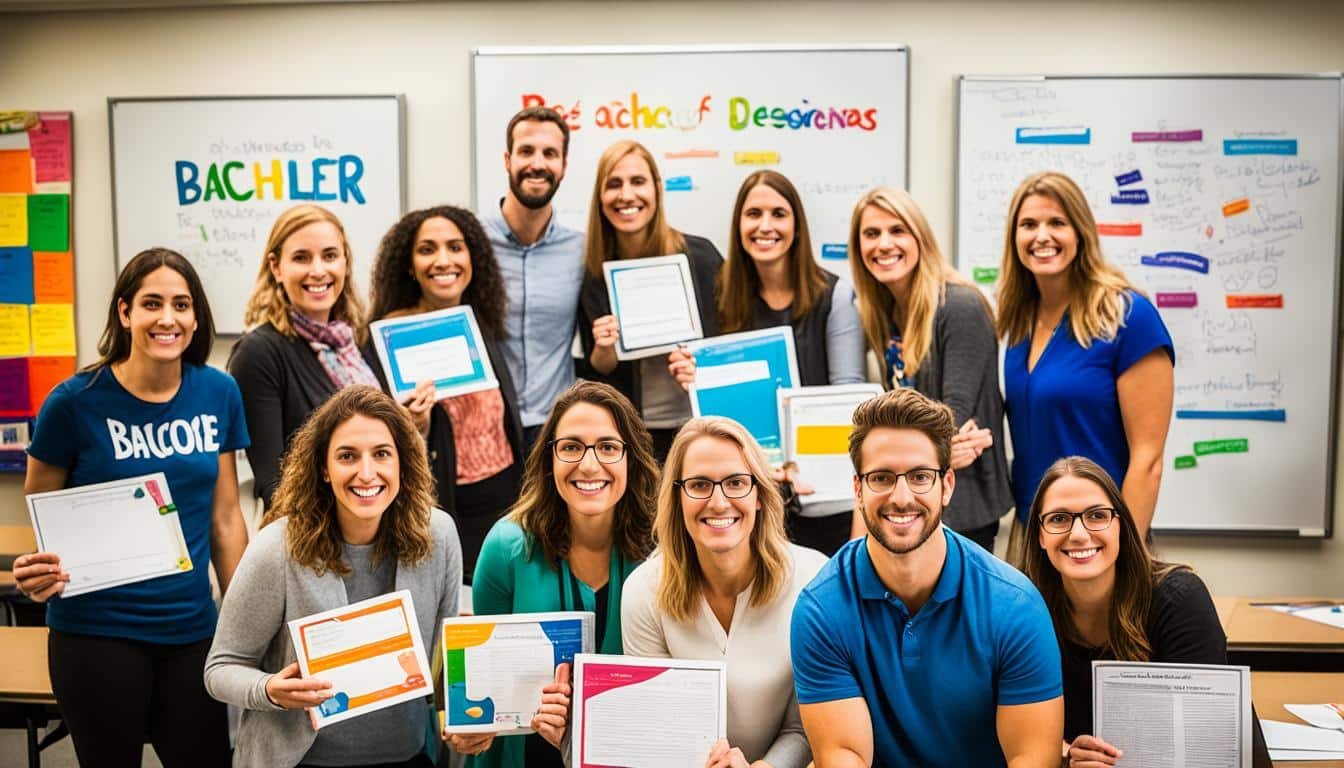To earn a Bachelor of Education degree, students must meet specific requirements that encompass both coursework and practical experience. These requirements ensure that aspiring educators are equipped with the necessary skills and knowledge to succeed in the teaching profession. Additionally, adherence to accreditation standards guarantees that graduates receive a recognized and respected degree.
Throughout their degree program, students will engage in a range of coursework that covers various aspects of education, including pedagogy, child development, classroom management, and subject-specific teaching methods. This coursework provides a solid foundation for future teachers, equipping them with essential skills and strategies to create engaging and effective learning environments for their students.
Also Read: What Does An Education Specialist Do?
In addition to coursework, students pursuing a Bachelor of Education degree are required to gain teaching experience. This typically involves completing practicum placements or internships in schools, where students have the opportunity to apply their knowledge and practice their teaching skills under the guidance of experienced educators. This hands-on experience is invaluable, as it allows aspiring teachers to interact with students, manage classrooms, and develop their instructional abilities.
Accreditation standards play a crucial role in ensuring the quality and rigor of Bachelor of Education programs. These standards are set by professional organizations and governing bodies in the field of education and serve as benchmarks for program excellence. By meeting these standards, students can be confident that their degree program aligns with industry expectations and prepares them to be competent and effective educators.
Overall, earning a Bachelor of Education degree requires dedication, commitment, and a passion for teaching. By fulfilling the coursework requirements, gaining hands-on teaching experience, and meeting accreditation standards, aspiring educators can embark on a fulfilling career that will positively impact the lives of their students.
Key Takeaways:
- Completing specific coursework and gaining teaching experience are essential requirements for a Bachelor of Education degree.
- Accreditation standards ensure program excellence and prepare graduates to be effective educators.
- Coursework covers various aspects of education, including pedagogy, child development, and subject-specific teaching methods.
- Teaching experience allows aspiring teachers to apply their knowledge and develop their instructional skills.
- Earning a Bachelor of Education degree requires dedication, commitment, and a passion for education.
Also Read: Lesley University: Discover Your Path In Higher Education
Teacher Education Program Highlights
Broward College offers a comprehensive Teacher Education Program (TEP) that prepares students to excel in the field of education. The program features a Bachelor of Science in Education, which provides aspiring educators with the necessary knowledge and skills to make a difference in the lives of students. With a strong focus on exceptional student education, the TEP also offers specialized degrees in Math and Science, catering to those with a passion for these subjects.
One of the key highlights of the Teacher Education Program is the job placement opportunities it provides. Broward College has established partnerships with the Broward County Public Schools District, offering students a direct pathway to employment. Graduates of the program have excellent prospects for securing positions as educators in the district, ensuring a seamless transition from their studies to their professional careers.
In addition to the practical training and coursework, the TEP at Broward College emphasizes the importance of hands-on experience. Students have the opportunity to gain real-world insights through field experiences, where they work alongside experienced educators in diverse educational settings. These experiences not only enhance their understanding of classroom dynamics but also allow them to apply theoretical knowledge into practice.
To provide a well-rounded educational experience, Broward College fosters a supportive and inclusive learning environment. The TEP faculty members are dedicated professionals who are passionate about shaping the next generation of educators. They provide mentorship and guidance, ensuring that each student receives personalized attention and support throughout their academic journey.
| Program Highlights: | Benefits: |
|---|---|
| Specialized degrees in exceptional student education, Math, and Science | Opportunity for job placement in Broward County Public Schools District |
| Hands-on field experiences in diverse educational settings | Supportive and inclusive learning environment |
| Experienced faculty providing mentorship and guidance | Practical application of theoretical knowledge |
The Teacher Education Program at Broward College equips students with the necessary skills and knowledge to become successful educators. With its strong emphasis on exceptional student education and job placement opportunities, this program is designed to prepare individuals for a fulfilling career in the field of education. Whether aspiring to teach exceptional students or specialize in Math and Science, Broward College provides the foundation and support needed for students to succeed.
Also Read: Bryant University: Education And Opportunities
Exploring Teaching Certification
Before embarking on a rewarding career in the teaching profession, it is vital to understand the requirements for teaching certification. Aspiring teachers must first decide on the subject area they wish to teach. In Florida, they can then apply for a Florida Temporary Certificate in their chosen subject.
The eligibility for the Florida Temporary Certificate is evaluated by the Bureau of Educator Certification. Prospective teachers must meet specific criteria, including a demonstrated mastery of the subject through passing scores on the appropriate Subject Area Examinations.
Each Florida school district has dedicated certification specialists who can provide valuable information and assistance during the certification process. These specialists are knowledgeable about the requirements, employment opportunities, and the necessary steps for obtaining certification.
Benefits of Seeking Certification
“The certification process ensures that teachers have a solid foundation in their subject area and are well-prepared for the classroom. It helps future educators gain essential knowledge and skills to effectively teach students.”
By exploring teaching certification requirements, prospective teachers demonstrate their dedication to the profession and their commitment to providing quality education to students. Certification offers numerous benefits, including:
- Validation of subject area expertise
- Increased employability
- Professional growth and development opportunities
- Opportunities for networking and collaboration with other certified educators
Mastering the Subject Area
To achieve certification, teachers must possess a comprehensive understanding of their chosen subject area. This includes knowledge of curriculum standards, instructional strategies, and assessment techniques.
Subject Area Examinations
The Subject Area Examinations are designed to assess a teacher’s mastery of their subject and ensure they possess the necessary knowledge to teach effectively. These examinations cover a wide range of topics within the subject area and are organized into distinct sub-tests.
The sub-tests include multiple-choice questions as well as complex performance tasks that require the application of subject area knowledge. It is important for prospective teachers to thoroughly prepare for these examinations to increase their chances of success.
Also Read: Explore Programs At Sacred Heart University
| Subject Area | Required Sub-Tests |
|---|---|
| English Language Arts | Reading and Language Arts |
| Mathematics | Mathematics |
| Science | General Knowledge and Subject Specific |
| Social Science | General Knowledge and Subject Specific |
Note: The subject areas and required sub-tests may vary depending on the specific teaching certification requirements in Florida.
By successfully completing these examinations, teachers demonstrate their competency and readiness to educate students in their chosen subject area.
Bachelor of Science in Education Concentrations

Nova Southeastern University offers a Bachelor of Science in Education degree, providing students with the opportunity to specialize through concentrations. These concentrations allow students to focus their studies on specific areas of interest within the field of education.
Computer Science Education Concentration
The Computer Science Education concentration is designed for students who want to combine their passion for education with technology. In this concentration, students will gain knowledge and skills related to computer science, coding, and technology integration in the classroom. They will learn how to effectively use technology to enhance the learning experience and engage students in STEM (Science, Technology, Engineering, and Mathematics) fields.
By completing this concentration, students will be well-prepared to teach computer science courses, integrate technology into their lessons, and prepare students for the digital age. They will acquire the necessary skills to foster critical thinking, problem-solving, and innovation in their classrooms.
Also Read: Modern And Classic: Belhaven University Journey
Teaching & Learning Concentration
The Teaching & Learning concentration is designed to equip students with innovative teaching strategies and classroom management techniques. Students in this concentration will explore the latest research and best practices in education, with a focus on creating engaging and inclusive learning environments.
Through coursework and practical experiences, students will develop a deep understanding of instructional methods, curriculum design, and assessment strategies. They will learn how to create effective lesson plans, differentiate instruction to meet the needs of diverse learners, and foster a positive classroom culture.
The Teaching & Learning concentration prepares students to be effective educators who can inspire and empower students to reach their full potential. Graduates will possess the skills and knowledge needed to create meaningful learning experiences and make a lasting impact on students’ lives.
Curriculum Details
The curriculum for each concentration within the Bachelor of Science in Education degree program is designed to provide students with a comprehensive understanding of their chosen specialization. Courses cover a range of topics related to the specific concentration, ensuring that graduates are well-prepared for their future careers as educators.
For detailed information about the curriculum, including specific course requirements and sequencing, prospective students can visit the Nova Southeastern University website or contact the College of Education directly.
Benefits of an Education Degree from NSU

Obtaining an education degree from Nova Southeastern University provides numerous benefits. Through our comprehensive program, students gain a comprehensive understanding of the education system, allowing them to make a positive impact on students’ lives. Let’s explore the key advantages of pursuing an education degree at NSU.
Diverse Setting and Student Population
One of the major benefits of an education degree from NSU is the exposure to a diverse setting and student population. Our program prepares educators to address the needs of students from various cultural backgrounds and identities. This equity and cultural awareness fosters inclusivity and promotes social responsibility in our graduates.
Cognitive and Language Development
NSU’s education degree program emphasizes the importance of supporting students’ cognitive and language development. Through research-based instructional practices and strategies, students learn to effectively engage and inspire their students. Graduates are equipped with the knowledge and skills necessary for facilitating optimal learning experiences.
Our education degree program at NSU is designed to promote a comprehensive understanding of teaching methodologies and best practices to address the diverse needs of students, fostering equitable and inclusive learning environments.
Equity and Cultural Awareness
Equity and cultural awareness are integral components of our education degree program. NSU strives to prepare educators who are sensitive to the diverse needs of their students, promoting fairness and inclusivity in the classroom. This comprehensive understanding allows graduates to create a supportive and empowering learning environment for all students.
Preparation for Various Educational Settings
NSU’s education degree program equips graduates to excel in a variety of educational settings. Whether in public schools, private institutions, or alternative learning environments, our program prepares educators to adapt to different settings and effectively engage students. Graduates have the flexibility and skills to succeed in diverse educational contexts.
With an education degree from NSU, students gain a comprehensive understanding of the education system and develop the skills necessary to become effective educators. The program’s emphasis on cognitive and language development, equity and cultural awareness, and a comprehensive understanding of teaching methodologies ensures that graduates are prepared to make a difference in the lives of their students.
Career Opportunities and Salary

Obtaining a Bachelor of Education degree opens up a world of diverse career opportunities in the field of education. Graduates with this degree can explore various roles and make a meaningful impact on students’ lives.
According to the U.S. Bureau of Labor Statistics, elementary school teachers earn an average salary of $59,420 per year, while high school teachers and middle school teachers earn $61,660 and $59,660, respectively.
Elementary school teachers play a vital role in shaping young minds and building a strong foundation of knowledge. They teach children basic subjects such as math, science, and reading, and help develop essential skills for future success.
High school teachers focus on specific subjects and guide students in depth towards their career aspirations. They facilitate learning in areas such as English, history, physics, and more, while also preparing students for college and beyond.
Middle school teachers work with students during a critical phase of their academic and personal development. They teach a variety of subjects to help students transition into more challenging coursework and provide valuable support during this transformative period.
NSU education alumni can be found in school districts nationwide, contributing to the K-12 education landscape. Many alumni also pursue administrative roles, supporting both students and future educators.
The Importance of Educators
“The beautiful thing about learning is that no one can take it away from you.” – B.B. King
Education plays a crucial role in society, and educators are the driving force behind it. They inspire, challenge, and guide students towards success, empowering them to become confident and well-rounded individuals.
By choosing a career in education, individuals have the opportunity to make a lasting impact on students’ lives and shape the future. It requires dedication, passion, and a commitment to lifelong learning.
Besides teaching, education professionals can pursue various other roles such as curriculum development, instructional coaching, educational consulting, and educational leadership.
Preparing for a Rewarding Career
NSU’s comprehensive education programs equip aspiring educators with the knowledge, skills, and practical experience necessary to succeed. The immersive curriculum focuses on pedagogical strategies, classroom management techniques, and effective assessment methods.
In addition to building a solid foundation in education theory, NSU students also gain hands-on experience through field placements and practicum opportunities. These experiences allow them to apply their knowledge in real classrooms, refine their teaching skills, and establish connections within the education community.
Building a Strong Network
- Attend education conferences and workshops to network with professionals in the field.
- Join professional organizations such as the National Education Association (NEA) or regional educational associations.
- Volunteer or participate in community outreach programs related to education.
- Engage in online platforms and forums dedicated to educational discussions and collaborations.
Building a strong network can provide career growth opportunities, mentorship possibilities, and access to resources that enhance professional development.
The Rewards of Education
Choosing a career in education goes beyond the financial rewards. Educators have the unique privilege of making a positive impact on the lives of their students, helping them discover their strengths, and nurturing their potential.
By sharing knowledge, fostering curiosity, and promoting critical thinking, educators shape not only the minds of their students but also the future of our society. Each day presents new challenges and opportunities for growth, making a career in education fulfilling and purposeful.
| Education Level | Average Salary |
|---|---|
| Elementary School Teacher | $59,420 per year |
| High School Teacher | $61,660 per year |
| Middle School Teacher | $59,660 per year |
Field Experiences and Experiential Learning

The Bachelor of Education program at Nova Southeastern University provides valuable field experiences to teacher candidates, allowing them to put their knowledge into practice as they work alongside experienced educators. This hands-on approach to learning ensures that future teachers gain the practical knowledge and skills necessary for success in the education field.
During these field experiences, students have the opportunity to serve as classroom teachers and engage with students in a real-world setting. By actively participating in classroom activities, teacher candidates can demonstrate their understanding of the Florida Educator Accomplished Practices and subject area competencies.
Field experiences offer teacher candidates the chance to apply instructional strategies, differentiate instruction based on students’ needs, and plan and implement engaging lessons. Through direct interactions with students, they develop the necessary classroom management skills and learn how to create a positive and inclusive learning environment.
These experiential learning opportunities also provide valuable insights into the diverse needs of students. Teacher candidates can engage with students from various backgrounds and cultures, fostering equity and cultural awareness in their teaching practices. This firsthand experience prepares future educators to meet the unique challenges and opportunities that come with teaching a diverse student population.
Furthermore, field experiences allow teacher candidates to reflect on their teaching methods and make adjustments based on feedback from both students and mentor teachers. This reflective practice is crucial for professional growth and development as educators.
By integrating field experiences and experiential learning into the Bachelor of Education program, Nova Southeastern University ensures that teacher candidates are well-prepared for their future careers as classroom teachers. These practical experiences not only enhance their understanding of educational practices but also equip them with the necessary skills to make a positive impact on students’ lives.
Benefits of Field Experiences and Experiential Learning:
- Integration of instructional strategies
- Differentiated instruction
- Engaging lesson planning
- Classroom management skills
- Creating a positive and inclusive learning environment
- Understanding the needs of diverse students
- Fostering equity and cultural awareness
- Reflective practice for professional growth
Professional Licensure and Dual Admission Programs

Florida participates in the National Association of State Directors of Teacher Education and Certification Interstate Agreement, enabling teacher certification and licensure reciprocity with over 50 other states and jurisdictions. This opens up opportunities for graduates interested in teaching outside of Florida to pursue their careers in different locations. If you’re considering teaching in another state, we advise you to reach out to that state’s department of education for specific requirements and procedures.
At NSU, we understand the importance of providing our students with a comprehensive educational experience that prepares them for their future. That’s why we offer the Dual Admission program, which allows students to reserve a spot in a graduate or professional school while earning their bachelor’s degree. This program provides a unique advantage, giving students a head start on their careers and helping them stay ahead in today’s competitive job market.
Advantages of the Dual Admission program:
- Seamless Transition: Dual Admission ensures a smooth transition from undergraduate to graduate or professional school, saving you time and effort during the application process.
- Curriculum Updates: By participating in the Dual Admission program, you’ll have access to the latest curriculum updates and advancements in your chosen field of study.
- Expanded Career Opportunities: Graduates with advanced degrees have access to a wider range of career opportunities and may qualify for higher-paying positions.
- Mentorship and Guidance: Throughout your academic journey, you’ll receive mentorship and guidance from experienced faculty members who are dedicated to your success.
By enrolling in NSU’s Dual Admission program, you’ll gain valuable knowledge and hands-on experience, setting you up for a successful and rewarding career in your chosen field. Whether you aspire to work in education, healthcare, business, or any other profession, our Dual Admission program will pave the way for your continued growth and achievement.
Joining a Supportive Educational Network

NSU’s College of Education fosters a supportive educational network that prioritizes the growth and success of its students. From dedicated faculty to motivated peers and accomplished alumni, the college provides a supportive community for aspiring educational leaders.
One of the key advantages of joining NSU’s College of Education is the abundance of networking opportunities. Students have the chance to connect with various educational leaders, including experienced teachers, school administrators, and experts in the field. These connections can lead to valuable insights, mentorship, and even career opportunities.
The college is committed to career preparation and understands the importance of equipping students with the necessary skills and knowledge for success in the ever-changing field of education. Through mentorship programs, students receive guidance and support from seasoned professionals who can offer valuable advice and industry insights. Additionally, the curriculum is continuously updated to reflect the latest trends and best practices in education, ensuring students are prepared to tackle the challenges of the modern educational landscape.
Another aspect that sets NSU’s College of Education apart is the faculty’s dedication to student success. Professors are not only experienced educators but also passionate about fostering excellence in teaching. They are committed to offering personalized attention, guidance, and mentorship to their students, helping them develop into competent and confident educators.
Furthermore, the college offers a range of mentorship programs and simulated and real-world classroom experiences, which allow students to apply their knowledge in practical settings. These experiences further enhance students’ skills and provide them with firsthand exposure to the demands and rewards of the teaching profession.
By joining NSU’s College of Education, students gain access to a supportive educational network that nurtures their growth, provides networking opportunities, prepares them for successful careers, and offers mentorship and guidance every step of the way. With the invaluable support of the faculty, fellow students, and influential connections, aspiring educators can confidently embark on their journey toward making a positive impact in the lives of students and shaping the future of education.
Also Read: Masters In Special Education: Advance Your Skills
Conclusion
Pursuing a Bachelor of Education degree provides individuals with the necessary qualifications to embark on a rewarding career in education. Meeting the specific requirements, such as completing coursework and gaining teaching experience, is crucial in obtaining this degree. Prospective educators should also prioritize obtaining the necessary certification and exploring the wide range of career opportunities available.
Joining a supportive educational network can greatly contribute to the success of educators. Networking with educational leaders and connecting with fellow students and alumni provides valuable opportunities for mentorship and career preparation. Additionally, participating in professional growth opportunities allows for continuous learning and development in the dynamic field of education.
By dedicating themselves to obtaining the required qualifications and actively engaging in the educational network, individuals with a Bachelor of Education degree can make a positive impact on the lives of students and contribute to shaping the future. Education is a noble profession, and with the right knowledge and skills, educators have the power to inspire and guide the next generation.
FAQs
Q: What is a Bachelor of Education degree?
A: A Bachelor of Education degree is an undergraduate program that prepares individuals for a career in teaching. It typically focuses on education theory, teaching methods, and practice in a specific subject or grade level.
Q: What are the common specializations available for a Bachelor of Education degree?
A: Common specializations for a Bachelor of Education degree include special education, elementary education, early childhood education, secondary education, physical education, and social studies.
Q: How can I become a licensed teacher with a Bachelor of Education degree?
A: In order to become a licensed teacher, you typically need to complete a Bachelor of Education degree, complete student teaching requirements, and pass any necessary licensure exams as per the licensure requirements in your state.
Q: Can I pursue a Bachelor of Education degree online?
A: Yes, many schools offer online programs for a Bachelor of Education degree. These online programs allow you to study at your own pace and convenience while still gaining the necessary knowledge and skills to become a teacher.
Q: What is accreditation and why is it important for a Bachelor of Education degree?
A: Accreditation is a process of validation that schools or programs meet certain standards of quality and integrity. It is important for a Bachelor of Education degree to be accredited as it ensures that the program is recognized and meets the necessary standards for licensure and career advancement.
Q: How can I apply for financial aid for my Bachelor of Education degree?
A: You can apply for financial aid for your Bachelor of Education degree by submitting a Free Application for Federal Student Aid (FAFSA) form. This form will determine your eligibility for various types of financial aid including grants, scholarships, and loans.
Q: What career opportunities can a Bachelor of Education degree lead to?
A: A Bachelor of Education degree can lead to various career opportunities such as becoming a teacher, school counselor, education administrator, curriculum developer, or instructional coordinator. It can also open doors for roles in educational research, advocacy, and policy making.





